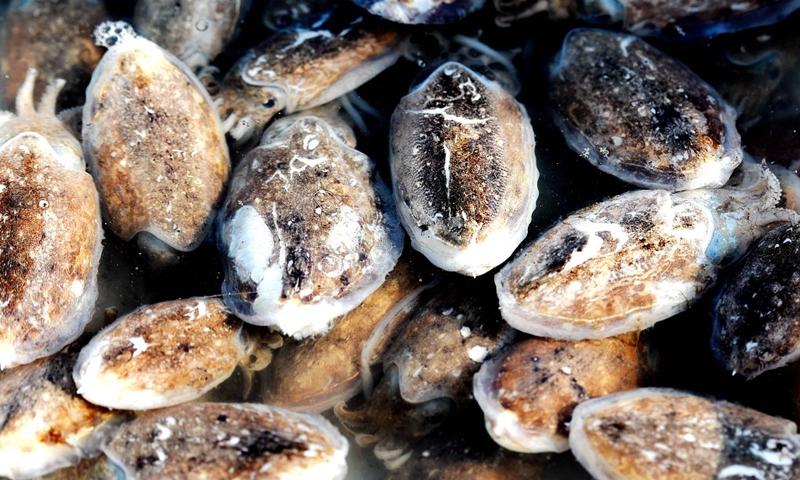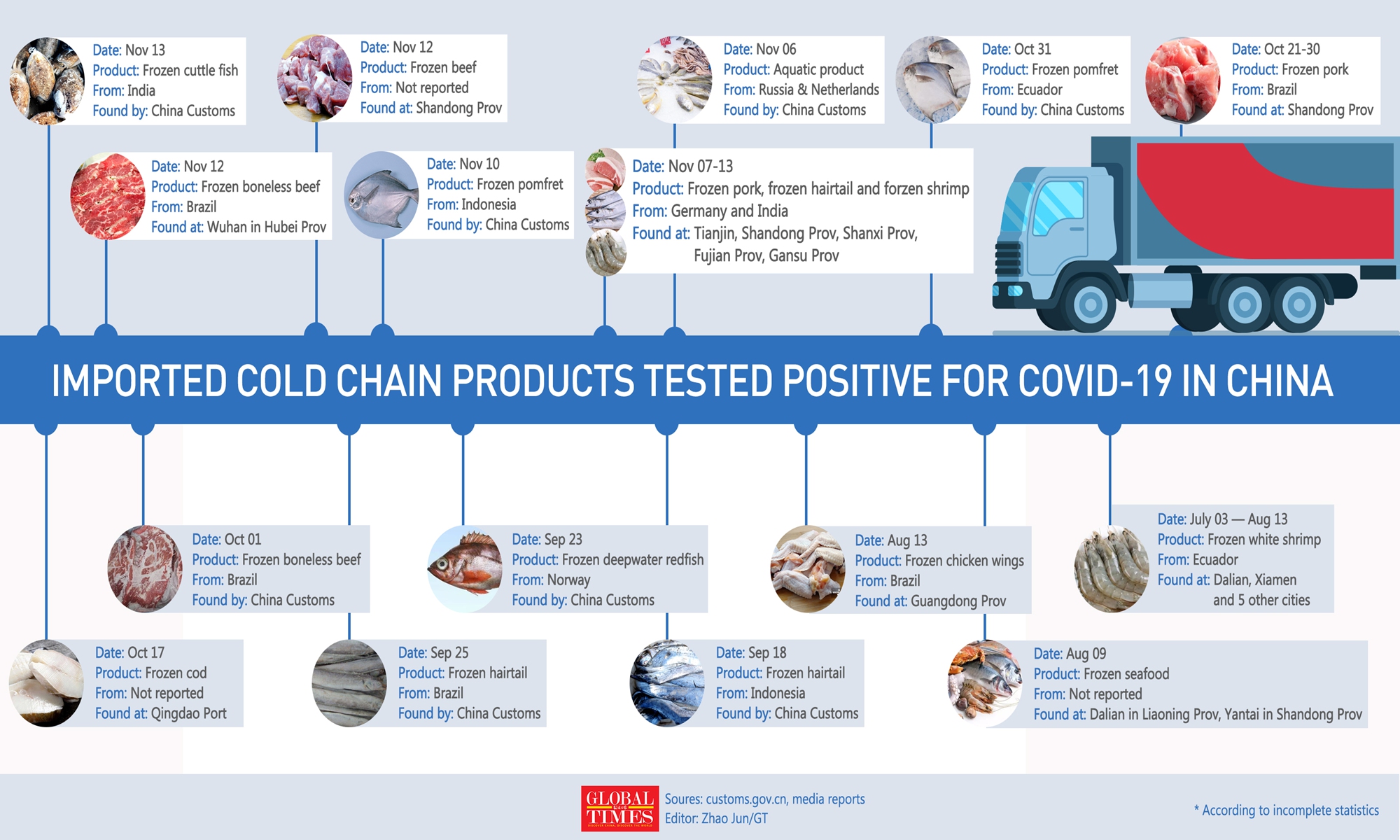China halts frozen product imports from Indian firm, surge in imported infections rings alarm of virus onslaught in winter
Source: Global Times Published: 2020/11/13 12:51:12 Last Updated: 2020/11/13 23:22:20

Frozen cuttle fish. File photo: VCG
At least five cases of COVID-19 contamination on imported frozen food have been reported by Customs and health authorities in China on Friday, as the public has grown increasingly vigilant over a surge in imported infections and a winter virus onslaught.
China's General Administration of Customs suspended seafood products from an Indian company for one week starting Friday, after novel coronavirus was found on the outer packaging of some samples of frozen cuttlefish. Northwest China's Lanzhou and East China's Quanzhou reported contaminated imported frozen food delivered from Tianjin.
In addition to frozen seafood, coronavirus was also found on the packaging of imported pork and beef. Liangshan county in East China's Shandong Province on Friday reported that packaging from one batch of imported frozen beef tested positive for the virus. Central China's Wuhan also reported they found coronavirus on imported beef.
It has been estimated that there have been at least 30 novel coronavirus cases detected in imported food cold chains since the first case in July.
And there is always a risk of imported cases from overseas arrivals. Wuhan on November 2 confirmed 23 COVID-19 infections imported from India, all of whom were Indian nationals on the same flight from New Delhi to Wuhan, including four confirmed patients and 19 asymptomatic infections.

Infographic: GT
As the temperature drops and the second wave of the global epidemic becomes fiercer, Deputy Foreign Minister Luo Zhaohui said at a Thursday press conference that China would face a tough challenge this winter.
Luo said that, as of now, China has reported more than 3,600 imported cases, and the number has increased rapidly since October. The current daily average of imported cases is 16.6, up 45 percent since September.
The cumulative number of cases globally has exceeded 52.7 million, with a recent high of over 600,000 new cases in a single day, six times the spring peak, media reported.
Chinese experts said that the risk in China hid under a worsening global pandemic, which needs more communication and international cooperation to cope with. Some experts are confident that China is unlikely to face a second onslaught of domestic-transmitted cases, and the infection will be controlled with vigilance.
China has a successful screening and quarantine mechanism for overseas arrivals from COVID-19-hit regions, and the next step is to introduce an equally effective mechanism for cold chain prevention and control, Xue Lan, a professor and former dean at the School of Public Policy and Management at Tsinghua University in Beijing, told the Global Times on Friday.
And the new mechanism is on the way. Bi Kexin, head of the import and export food safety bureau of the General Administration of Customs, told a press conference on Thursday that Chinese Customs will further enhance their inspection of cold-chain imported food.
China has communicated with the authorities of 109 countries on the export of cold-chain food products to China, Bi said, adding that 140 cold-chain food producers from 50 countries have been inspected, and 22 companies have been dealt with regarding unqualified products.
As of Wednesday, a total of 873,475 samples had been tested by Customs across China, among which 13 had positive nucleic acid test results, media reported.
China's State Council on Monday required that all imported cold-chain food be thoroughly disinfected before going to the market, and related products are also required to be fully sterilized, including loading and transporting carriers, and the inner and outer packaging.
If an imported food product tests positive for COVID-19, it will be returned or destroyed in accordance with the regulations.
Yang Zhanqiu, deputy director of the pathogen biology department at Wuhan University, told the Global Times that winter is a season that the virus becomes more active, and the public should be more alert rather than panicky.
In the absence of a domestic-originated outbreak, imported cases can be controlled, said Yang, noting that China can have a safe winter as long as it keeps a tight grip on screening imported cold-chain food.
However, as long as the pandemic does not end, cold-chain food imports will always be risky, Yang said.
If the risk of cold-chain imports continues to soar, diplomatic communication with relevant countries and departments is needed to avoid extreme measures, such as a complete shutdown of imports, said Xue, urging exporting countries to strengthen protection and testing of cold-chain workers to reduce the risk at the source, as the frozen food is not just destined for China.
"Countries must not let political prejudice hinder cooperation in the fight against COVID-19," Xue said.
Some analysts said that as human beings know more about the virus and vaccines are developed, China and other countries could consider giving workers at cold-chain industry priority in vaccinations.
Local disease control and health authorities should report cases in a timely manner and strengthen "risk communication" so as to reassure residents and not affect their lives, Xue said.
RELATED ARTICLES:
Posted in: SOCIETY,CHINA FOCUS